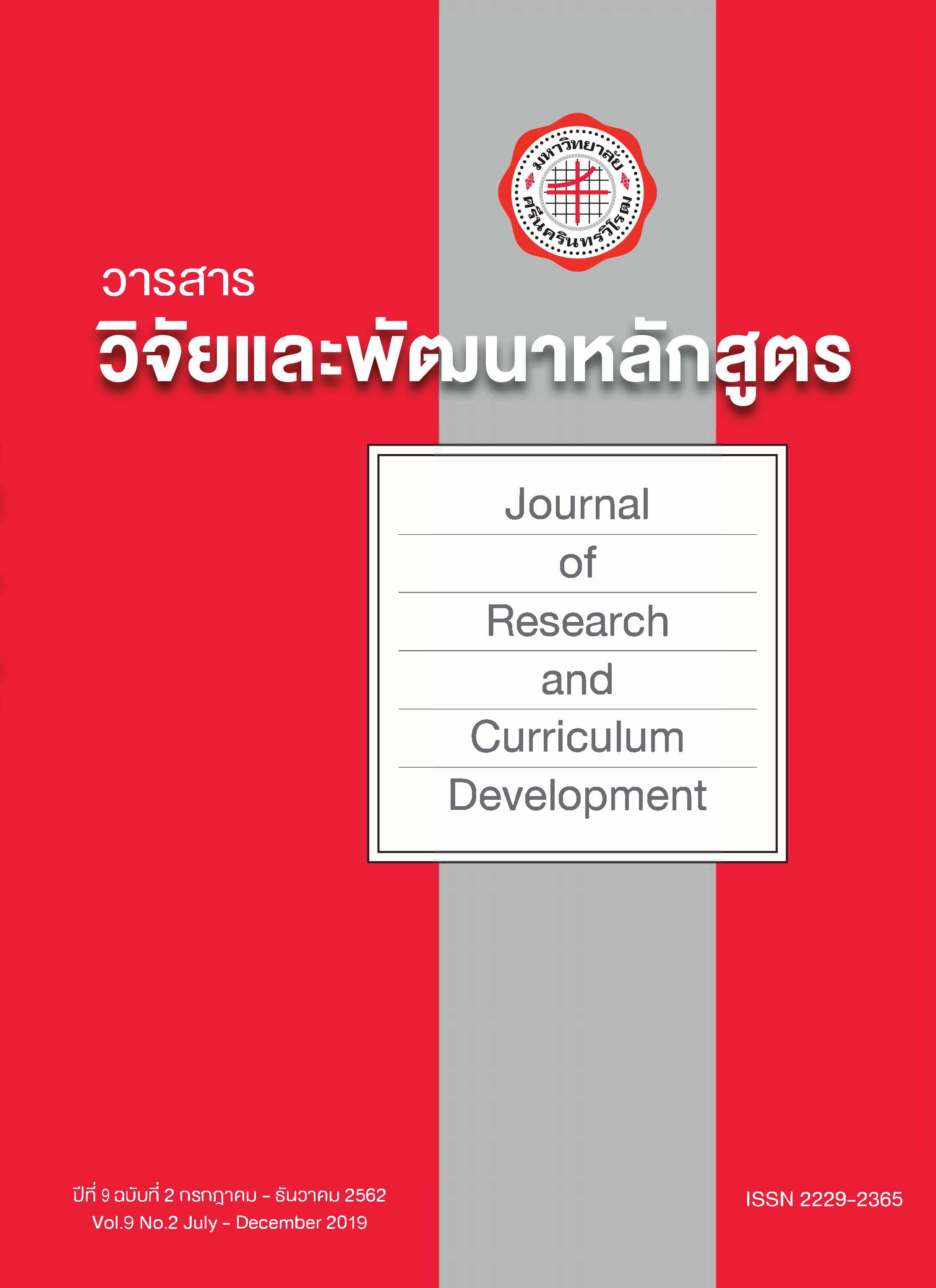รูปแบบการจัดการเรียนรู้ที่เสริมสร้างคุณลักษณะความเป็นพลเมืองเชิงวิชาชีพสำหรับนักศึกษาพยาบาล
Keywords:
A Learning Manageent Model to Enhance the Civic professional attributes Civic Professional Attributes, Nursing studentAbstract
The purpose of this research was to study the effectiveness of a learning management model to enhance the civic professional attributes of nursing students.The study was manipulated as time series design. The random selection was multiple – stage random sampling, included 30 nursing students that studied in 3rd year at Borommarajonani college of nursing changwat Nonthaburi. The learning management plan was composed of activities as follows : (1) preparation of learner before practice that was composed of two subactivities, as follows: 1) self – assessment, and 2) preparation about knowledge; skill; ability; and attribute for learning. (2) learning practice in real life situations which was composed of two subactivities, as follows: 1) nursing intervention based-on civic professional attributes, and 2) team work based-on civic professional attributes. The learning process concerned with continuous quality improvement. It was run continuously with 4 steps, as follows: 1) Plan; 2) action; 3) evaluation and feedback, and 4) reflection; and the process was run continuously.
The research results were found that the civic professional attributes in terms of an overview and each factors were higher at a statistically significant rate (p=.05), and their development had also improved. It showed that the implementation of the leaning management model met every criteria of model effectiveness, as follows: 1) a mean of civic professionalism attributes in terms of an overview and each factors were higher at a statistically significant rate (p=.05), and 2) the development of civic professional attributes in terms of an overview and each factors were improved. The findings indicated that the model could enhance the civic professional attributes of nursing students.
References
ส่งเสริมการศึกษาและจริยธรรม.
จตุพร ขาวมาลา. (2561) การพัฒนารูปแบบการจัดการเรียนรู้ที่เสริมสร้างคุณลักษณะความเป็นพลเมืองเชิง
วิชาชีพสำหรับนักศึกษาพยาบาล. การวิจัยและพัฒนาหลักสูตร บัณฑิตวิทยาลัย. .
จินตนาภรณ์ วัฒนธร. (2553). บทบาทของสมองต่อการเกิด สมาธิ แรงจูงใจ การเรียนรู้ และความจำ.
วารสารหลักสูตรและการเรียนการสอนมหาวิทยาลัยขอนแก่น. 4(1-2): 12-18
ชนาธิป พรกุล. (2554). การสอนกระบวนการคิด ทฤษฎีและการนำไปใช้. พิมพ์ครั้งที่ 2. กรุงเทพฯ:
วีพริ้น.
ชัยอนันต์ สมุทวณิช; และคนอื่น ๆ .(2553, มกราคม-มิถุนายน.). วัฒนธรรมพลเมือง.
วารสารสถาบันวัฒนธรรมและศิลปะ มหาวิทยาลัยศรีนครินทรวิโรฒ. 11(2): 7-10.
ทิศนา แขมมณี. (2556). ศาสตร์การสอน: องค์ความรู้เพื่อการจัดกระบวนการเรียนรู้ที่มีประสิทธิภาพ.
กรุงเทพ: สำนักพิมพ์แห่งจุฬาลงกรณ์มหาวิทยาลัย.
นุชลี อุปภัย. (2558). จิตวิทยาการศึกษา. กรุงเทพฯ: สำนักพิมพ์แห่งจุฬาลงกรณ์มหาวิทยาลัย.
บุญชม ศรีสะอาด. (2535). หลักการวิจัยเบื้องต้น. พิมพ์ครั้งที่ 3. กรุงเทพฯ: สุวีริยาสาสน์.
ปภัสสร ไพบูลย์ฐิติพรชัย. (2553). การศึกษาความเป็นพลเมืองดีของนักเรียนโรงเรียนพณิชยการบางบัวทอง
จังหวัดนนทบุรี. วิทยานิพนธ์ ศศ.ม. (การจัดการภาครัฐและภาคเอกชน). กรุงเทพฯ:
บัณฑิตวิทยาลัย มหาวิทยาลัยศิลปกร. ถ่ายเอกสาร.
ปลินธร เพ็ชรฤทธิ์. (2550). สภาพและปัญหาการจัดกิจกรรมการเรียนการสอนเพื่อพัฒนาคุณลักษณะ
ความเป็นพลเมืองดีให้แก่นักเรียนมัธยมศึกษาของครูสังคมศึกษา. วิทยานิพนธ์ ค.ม.
(การสอนสังคมศึกษา). กรุงเทพฯ: คณะครุศาสตร์ จุฬาลงกรณ์มหาวิทยาลัย. ถ่ายเอกสาร.
พูนภัทรา พูลผล. (2557, กรกฎาคม-กันยายน). การพัฒนารูปแบบการบริหารงานวิชาการในสถานศึกษา
ขั้นพื้นฐานเพื่อเตรียมผู้เรียนสู่ความเป็นพลเมืองโลก. วารสารวิจัยการศึกษา. 2(4): 27-37.
วรวรรณ วาณิชย์เจริญชัย. (2553). การเรียนรู้จากการปฏิบัติ: การประยุกต์ใช้ในการเรียนการสอน.
วารสารพยาบาลศาสตร์. 28(4): 36-44.
วรากรณ์ สามโกเศศ. (2558, 25 สิงหาคม). ว่าด้วย Active Citizen. กรุงเทพธุรกิจ. หน้า 10.
ศิริวรรณ พิริยะสุรวงศ์. (2555, กันยายน-ธันวาคม). การจัดการเรียนรู้แบบร่วมมือกันโดยใช้แท็บเล็ต
ในโรงเรียนมัธยมศึกษา. วารสารวิทยบริการ. 23(3): 225-235.
สถาบันพระปกเกล้า. (2555). ความเป็นพลเมืองในประเทศไทย. สืบค้นเมื่อ 11 ตุลาคม 2557,
จาก https://www.kpi.ac.th.
สมาคมพยาบาลแห่งประเทศไทยในพระบรมราชูปถัมภ์ของสมเด็จพระศรีนครินทราบรมราชชนนี. (2546).
จรรยาบรรณพยาบาล ฉบับปี พุทธศักราช 2546. สืบค้นเมื่อ 10 เมษายน 2557,
จาก www.nur.psu.ac.th/Report_mis/file/b.pdf.
สภาการพยาบาล. (2553). สมรรถนะผู้ประกอบวิชาชีพการพยาบาลและการผดุงครรภ์. พิมพ์ครั้งที่ 2.
กรุงเทพฯ: ศิริยอดการพิมพ์.
Bandura, Albert. (1977). Self-efficacy: Toward a Unifying Theory of Behavior Change.
Psychological Review. 84(2): 191-215.
Brannelly, Tula. (2011). Sustaining Citizenship: People with Dementia and the Phenomenon
of Social Death. Nursing Ethics. 18(5): 662-671.
Burgess, Caroline A.; Reimer- Kirkham, Sheryl; & Astle, Barbara (2014). Motivation and
International Clinical Placements: Shifting Nursing Students to a Global
Citizenship Perspective. International Journal of Nursing Education Scholarship.
11(1): 1-8.
Day, Lisa. (2005, September). Nursing Practice and Civic Professionalism.
American Journal of Critical Care. 14(5): 434-437.
Dilworth, Robert L; & Willis, Verna J. (2003). Action learning: Images and Pathways.
Florida: Krieger.
Froiland, John Mark; et.al. (2012). Intrinsic Motivation to Learn: The Nexus between
Psychological Health and Academic Success. Contemporary School Psychology.
16: 91-100.
Geake, John G. (2009). The Brain at School: Educational Neuroscience in the Classroom.
New York: The Mc Grow-Hill.
Johnson; & Johnson. 1994: 58)
Johnson, David W.; & Johnson, Roger T. (1994). Learning Together and Alone:
Cooperative and Individualistic Learning. 4th ed. New Jersey: Prentice Hall.
Lawton, Denis; Cairns, Jo; & Gardner, Roy. (2000). Education for Citizenship. London:
Gromwell Press.
Kambi, Niranjan; & Jain, Neeraj. (2012, November). Landmark Discoveries in Neurosciences.
Resonance. 1054-1064.
Kazemipour, Farahnaz. (2012). The Impact of Workplace Spirituality Dimensions on
Organizational Citizenship Behavior among Nurses with the Mediating Effect of
Affective Organizational Commitment. Journal of Nursing Management.
2012 (20): 1039-1048.
Kelly, Fiona; & Innes, Anthea. (2012). Human Rights, Citizenship and Dementia Care Nursing.
International Journal of Older Nursing. (December 2011): 61-70.
Klausmeier, Herbert J. (1985). Educational psychology. 5th ed. New York: Harper & Row.
Ryan, Richard M.; & Deci, Edward L. (2000). Intrinsic and Extrinsic Motivations: Classic
Definitions and New Directions. Contemporary Educational Psychology.
25: 54–67.
Sarter M; & Lustig C. (2009). Attention and learning and memory. In L.R. Squire, (Ed.).
New encyclopedia of neuroscience (pp.1-15). Oxford: Elsevier.
Sprenger, Marilee. (1999). Becoming a “Wiz” at Brain –Based Teaching. California: Corwin.
UNESCO. (2014). Global Citizenship Education: Preparing Learners for the
Challenges of the 21st Century. Retrived October, 11 2014,
from https://unesco.org/new/en/global-citizenship-education





